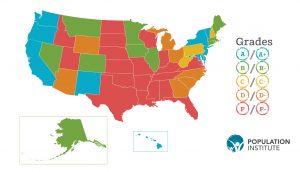Population Institute’s Report Card for 2018 Shows 19 States Getting Failing Grades Amid Continued Attacks on Reproductive Health and Rights

WASHINGTON, D.C. – On the 46th anniversary of the Roe v. Wade decision the Population Institute is releasing its seventh annual 50-State Report Card on Reproductive Health and Rights. The grade for the U.S. as a whole remains at a “D-“ in this year’s report card, but reproductive rights are coming under intensified assault. In particular, the appointment of Brett Kavanaugh to the U.S. Supreme Court could have an adverse impact on future court decisions regarding access to family planning and abortion services. At the state level, 26 states received a “D” or lower, with 19 states receiving a failing grade. The report card, the most comprehensive of its kind, tracks multiple indicators of reproductive health and rights, including access to family planning and abortion services.
The Institute’s president, Robert Walker, said, “On this year’s anniversary of Roe, more than any in the last 46 years, supporters of reproductive rights need to be concerned about the erosion of their constitutionally protected rights. Roe is still the law of the land, but many states are restricting access to abortion services. Last year we said that the U.S. was in danger of becoming ‘The Divided States of Reproductive Health and Rights’ and that danger persists. A woman’s ability to access affordable reproductive health care increasingly depends on where she lives, and if Roe is overturned, or its protections curbed, the legal divide will be even sharper. And, if so, many more women will be effectively denied access to abortion services, and maternity mortality rates will rise as a consequence.”
The National Grade
The U.S., as a whole, received a “D-“. While federal law and federal funding levels remain largely unchanged, new threats emerged in 2018:
· Title X– In a move that jeopardizes the future status of family planning clinics receiving Title X funding, the Trump administration last year drafted a proposed rule that would deny funding to family planning clinics that provide clients with information about the availability of abortion services. The so-called “domestic gag rule” could cut off funding to many of the existing providers, including—but not limited to—Planned Parenthood.
· The ACA’s Contraceptive ‘Mandate” – The Trump Administration finalized regulatory changes to the Affordable Care Act, which would allow employers with “religious” or “moral” objections to drop coverage of contraception in the health insurance policies provided to their employees. Two federal courts have put a stay on the proposed changes to the birth control mandate, but the U.S. Supreme Court has yet to weigh in.
· Conservative Court Appointments – In addition to the appointment of Brett Kavanaugh to the U.S. Supreme Court, the U.S. Senate has confirmed dozens of Trump-nominated judges to the lower federal courts, raising concerns that the federal judiciary will curb access to reproductive health care in the U.S.
State Grades
Ten states (California, Washington, D.C., Hawaii, Maryland, New Jersey, New Mexico, New York, Oregon, Vermont, and Washington) received an “A” in this year’s report. The 19 states receiving a failing grade in 2018 included Alabama, Arkansas, Florida, Idaho, Indiana, Kansas, Kentucky, Louisiana, Mississippi, Missouri, Nebraska, North Dakota, Oklahoma, South Dakota, Tennessee, Texas, Utah, Virginia, and Wisconsin.
Understanding the Results
In releasing this year’s 50-State report card, Walker noted that “This year’s report card reflects the fact that reproductive health and rights remain under critical assault at the state and federal levels. While reproductive health advocates scored significant victories in the 2018 elections, the war on reproductive rights is far from over. Over the last eight years 424 abortion restrictions have been passed at the state level.”
The Guttmacher Institute recently reported that in 2018—for the first time in recent years—new policies protecting reproductive rights outnumbered new restrictions. Walker cautioned, however, “No one should be complacent. Anyone concerned about the state of reproductive health and rights in the U.S. should be paying close attention to what is happening at the national, state and local levels. This fight is far from over, and the worst may be yet to come.”
Methodology
Using eleven criteria, the Institute’s report card ranked each of the 50 states and the District of Columbia:
· Thirty percent of the grade is based on measures of effectiveness. This includes the latest available data on the teenage pregnancy rate (15%) and the rate of unintended pregnancies (15%).
· Twenty-five percent of the grade is based upon prevention. This includes mandated comprehensive sex education in the schools (15%), access to emergency contraception (5%), and minors’ access to contraceptive services (5%).
· Twenty-five percent of the grade is based upon affordability. This includes if states are expanding Medicaid under the Affordable Care Act (15%), Medicaid eligibility rules for family planning (5%), and restrictions of insurance coverage of abortion (5%).
· The final 20 percent of the grade is based upon clinic access. This includes abortion restrictions (10%), TRAP Laws (5%), and percent of women living in a county without an abortion provider (5%).
Based upon their scores, each state received a “core” grade (A, B, C, D or F), but some states received an additional “plus” or a “minus” for factors not reflected in the core grade.
# # #
For a copy of the report, including a state-by-state breakdown, visit the Population Institute’s website (www.populationinstitute.org/reportcard). For questions about the report, call Jennie Wetter, Director of Public Policy, at (202) 544-3300, ext. 108.
A special thanks to the Guttmacher Institute whose research made this report card possible.